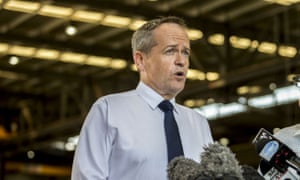Extract from The Guardian
In December, the ABC announced it would cease transmitting local
radio broadcasts through shortwave radio in the Northern Territory and
parts of the Pacific at the end of January.
It did so without community consultation and sparked a backlash from users who say the service is vital in remote areas.
Federal politicians from both major parties in the NT have lobbied the ABC to reverse its decision.
On Thursday, Shorten wrote to Turnbull, asking him to work with ABC management, local stakeholders and Labor “as a matter of urgency to ensure the continued provision of shortwave radio service in the NT beyond 31 January 2017.”
“The ABC’s claim that the majority of listeners will be able to access ABC services via AM/FM radio, digital radio and online streaming, or via VAST [viewer access satellite television] platform does not account for the reality of service availability in remote areas,” wrote Shorten.
“This helps to explain why listeners and users of the ABC shortwave in the Northern Territory have been unequivocal in voicing their concern at the Coalition’s failure to intervene in this matter. This includes emergency services workers and cattle growers.
“I am also deeply concerned that the ABC took this decision without satisfactory consultation with affected listeners, community representatives and emergency service workers and agencies. ABC Managing Director Michelle Guthrie has since acknowledged shortfalls in this regard.”
Outback residents and workers have told Guardian Australia the service, which broadcasts ABC local radio beyond the reach of AM and FM signals, is vital for several reasons, including the mental and emotional wellbeing of people who spend their waking hours on the land.
They have also said the alternatives repeatedly proffered by the ABC do not fill the gap. Satellite radio requires a set-top box and a stationary dish, and both digital and online radio are unavailable beyond signal reception.
Others have expressed concern they will also lose ABC emergency broadcasts during fires, floods, and in other situations. The ABC refuted the assertions, and said weather updates and emergency alerts could still be heard through HF broadcasts by the Bureau of Meteorology and the Royal Flying Doctors Service.
At a meeting last week with Guthrie, the NT Labor senator Malarndirri McCarthy and the shadow communications minister, Mark Dreyfus, failed to sway the ABC to reverse its decision.
Nigel Scullion told Guardian Australia he had written to the ABC asking it to reconsider, and other federal ministers including Julie Bishop and Mitch Fifield have also expressed their concern.
McCarthy told Guardian Australia there were “contractual issues” at play in the ABC’s immovability. Guardian Australia understands the infrastructure – which is considered ailing and expensive to maintain – is managed under a contract due to expire, and the ABC is thought to be unwilling to sign on for a long-term contract renewal.
A spokeswoman for Fifield said the decision was a matter for the ABC and not related to government funding.
“The ABC has legislated independence to make operational decisions free of political involvement. However, the government has asked for some further information.”
It did so without community consultation and sparked a backlash from users who say the service is vital in remote areas.
Federal politicians from both major parties in the NT have lobbied the ABC to reverse its decision.
On Thursday, Shorten wrote to Turnbull, asking him to work with ABC management, local stakeholders and Labor “as a matter of urgency to ensure the continued provision of shortwave radio service in the NT beyond 31 January 2017.”
“The ABC’s claim that the majority of listeners will be able to access ABC services via AM/FM radio, digital radio and online streaming, or via VAST [viewer access satellite television] platform does not account for the reality of service availability in remote areas,” wrote Shorten.
“This helps to explain why listeners and users of the ABC shortwave in the Northern Territory have been unequivocal in voicing their concern at the Coalition’s failure to intervene in this matter. This includes emergency services workers and cattle growers.
“I am also deeply concerned that the ABC took this decision without satisfactory consultation with affected listeners, community representatives and emergency service workers and agencies. ABC Managing Director Michelle Guthrie has since acknowledged shortfalls in this regard.”
Outback residents and workers have told Guardian Australia the service, which broadcasts ABC local radio beyond the reach of AM and FM signals, is vital for several reasons, including the mental and emotional wellbeing of people who spend their waking hours on the land.
They have also said the alternatives repeatedly proffered by the ABC do not fill the gap. Satellite radio requires a set-top box and a stationary dish, and both digital and online radio are unavailable beyond signal reception.
Others have expressed concern they will also lose ABC emergency broadcasts during fires, floods, and in other situations. The ABC refuted the assertions, and said weather updates and emergency alerts could still be heard through HF broadcasts by the Bureau of Meteorology and the Royal Flying Doctors Service.
At a meeting last week with Guthrie, the NT Labor senator Malarndirri McCarthy and the shadow communications minister, Mark Dreyfus, failed to sway the ABC to reverse its decision.
Nigel Scullion told Guardian Australia he had written to the ABC asking it to reconsider, and other federal ministers including Julie Bishop and Mitch Fifield have also expressed their concern.
McCarthy told Guardian Australia there were “contractual issues” at play in the ABC’s immovability. Guardian Australia understands the infrastructure – which is considered ailing and expensive to maintain – is managed under a contract due to expire, and the ABC is thought to be unwilling to sign on for a long-term contract renewal.
A spokeswoman for Fifield said the decision was a matter for the ABC and not related to government funding.
“The ABC has legislated independence to make operational decisions free of political involvement. However, the government has asked for some further information.”

No comments:
Post a Comment